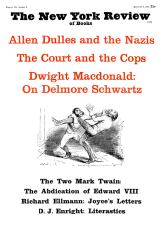To the Editors:
In reply to your recent inquiry, I fear that I must, for personal reasons, disqualify myself as a reviewer of Radicalism in America (Crowell) by Sidney Lens. The reason, however, may interest your readers. It brings up a question of literary ethics.
The question is: How far can one writer go in using the work of another writer without attribution? Mr. Lens happens to have helped himself to chunks of my own work on the American Communist movement. I do not, of course, object to such use. I myself make use of other people’s work, and I suppose that it would be difficult to do almost any kind of historical work without in some part and in some way utilizing previous work.
But it is an elementary rule to give credit or to indicate in some form one’s debt to anyone worth borrowing from. Not only does Mr. Lens choose to ignore this customary practice, but he is brazen enough to suggest to his readers that he is the first one to make known a portion of his story which he has taken bodily, with only some superficial rewriting, from my book, The Roots of American Communism (Viking, 1957).
Mr. Lens introduces the subject of American Communism by way of Louis C. Fraina, later better known as Lewis Corey, of whom he writes: “Communist histories, if they mention him at all, do so only in derogation, and it is doubtful if more than a handful can identify him” (p. 266).
I am not sure whether Mr. Lens is here referring to “official” Communist histories, sure as William Z. Foster’s book, or to any other histories of the American Communist movement, such as my books. If he means the former, then he should know that they do not mention Fraina at all. If he means the latter, then he must mean that only a handful have read my book in the past decade. I can assure him that the number is somewhat higher. Then Mr. Lens writes two pages on Fraina in which there is virtually not a single fact that does not appear in my book. I could, if it were worth the effort, draw up parallel columns to show how he has simply reworded, sometimes with a minimum of invention, my sentences. To save space I will content myself with typical examples of his method.
I wrote of Fraina: “He was a small, physically weak child…His favorite refuge was reading.” Mr. Lens writes: “He was a small boy, physically puny, but he was an incessant reader…” I wrote: “He began with the literature of revolt—…. Upton Sinclair, Jack London…” Mr. Lens writes: “Fraina was a self-made convert to the revolution, lured to it after reading the works of such social critics as Jack London and Upton Sinclair.” I put together the Fraina story and other matters of the same kind through months of weary research. I found and used unpublished (and still unpublished) first-hand material not available anywhere else.
I do not mean to suggest that Mr. Lens is indebted to me alone. In other sections, I detected quite a few operations of the same kind. In his Acknowledgements, Mr. Lens expresses his gratitude to three readers of his manuscript, Dr. Harry W. Laidler, Dr. Harry Elmer Barnes, and Professor Staughton Lynd. He cites about ten writers in his text. But he never owns up to the sources which did a large part of his work. Mr. Lens may say that he did not wish to clutter up the pages of his popularization with footnotes and attributions. I do not think that is good enough, especially where he implicitly claims to have made an original contribution. Since Mr. Lens did not mind dropping the names of about ten writers in his text, to whom he owed a small fraction of what he owed to me, I think that he could have found a way to acknowledge this debt without too much trouble.
Again, I do not question Mr. Lens’s use of original sources. I question basing pages on another’s work, with the most superficial rewriting, without some kind of attribution. I question the effrontery of giving his readers the impression that he is the first one to tell Louis Fraina’s story to more than a handful.
In his opening paragraph, Mr. Lens defines the radical as one who “has tried to repair the balance between those who have too much and those who have too little.” Apparently Mr. Lens has his own way of repairing the balance.
Theodore Draper
Gay Head. Massachusetts
This Issue
September 8, 1966



